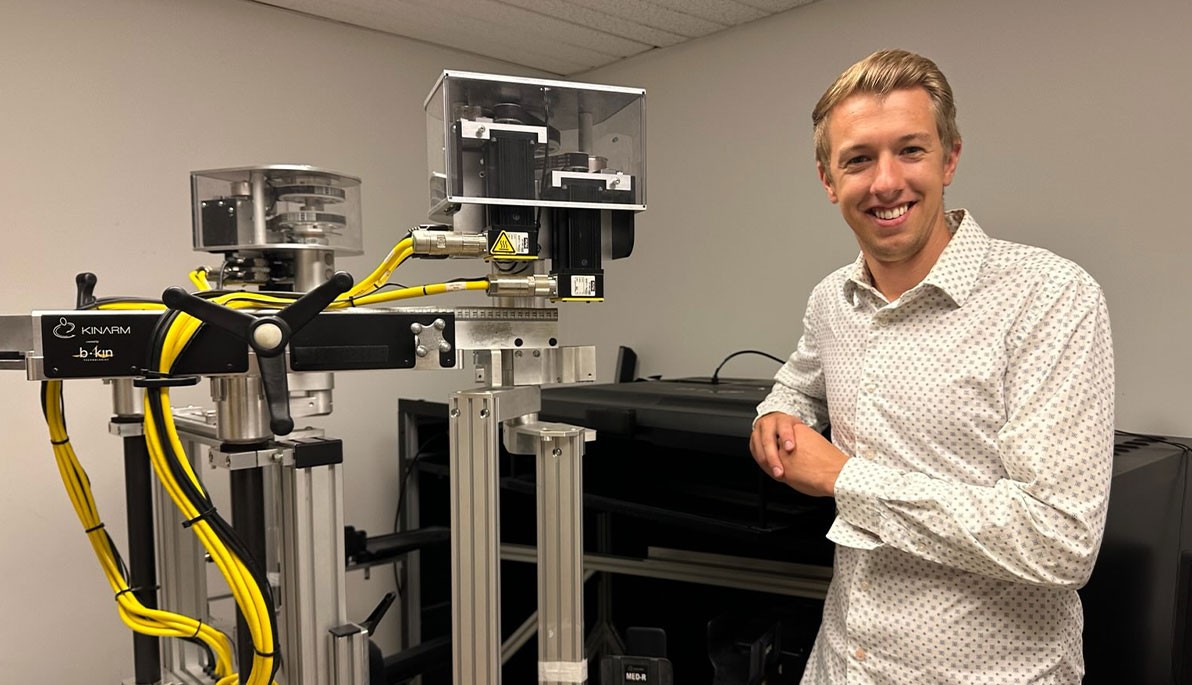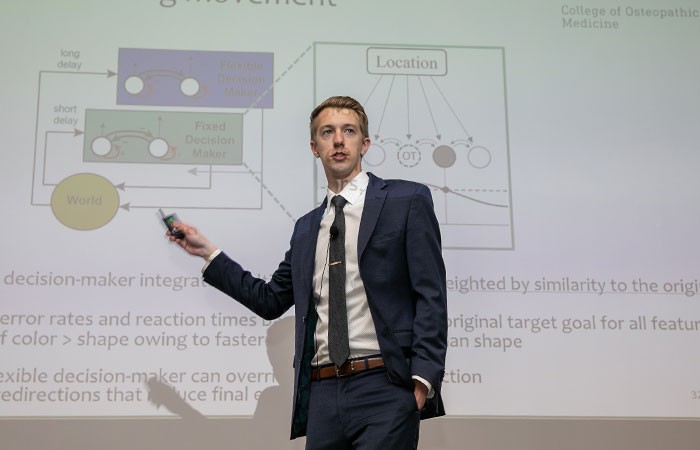
Student Profile: Daniel Tanis

Major: Osteopathic Medicine, D.O./Medical & Biological Sciences, Ph.D.
Year Expected to Graduate: 2025
Campus: Long Island
Hometown: Bloomingdale, N.J.
The Making of a Physician-Scientist
Growing up, Daniel Tanis claims his science experiments nearly drove his parents to the brink of insanity. Attempting to extract hydrogen from water, building model rocket engines, and making hovercrafts with his dad’s leaf blower are just a few of the antics fueled by Tanis’ unyielding love for science, technology, building, and experimentation.
An aspiring medical professional with the heart of an engineer, Tanis was able to fuse his passions when he pursued a bachelor’s degree in biomedical engineering at New Jersey Institute of Technology. There, he studied movement disorders and motor rehabilitation for stroke patients—a research endeavor that would later inspire him to study medicine at New York Tech.
Here, Tanis is making New York Tech history as one of the first students to participate in the College of Osteopathic Medicine’s (NYITCOM) combined Osteopathic Medicine D.O./Medical & Biological Sciences Ph.D. program. The D.O./Ph.D. program represented a major milestone for New York Tech and the medical school when it was announced in 2018 and became the institution’s first Doctor of Philosophy (Ph.D.) program.
Students enrolling in the program embark on a seven-year journey—two years of pre-clinical coursework, three years of Ph.D.-level coursework—culminating in a dissertation defense, and two years of clinical training.
With aspirations of performing biomedical research throughout his career, pursuing solely a D.O. degree would have granted Tanis plenty of opportunity to carry out this work. But combined with the dedicated research training that comes with earning a Ph.D., he believes that, upon completion of the seven-year program, he will graduate with the skill set he needs to succeed as a physician-scientist.
“The prospect of using research to improve someone’s quality of life was very meaningful to me,” Tanis explains. “This is what ultimately motivated me to pursue the D.O./Ph.D. degree at New York Tech.”
In May 2023, Tanis became the first D.O./Ph.D. candidate to deliver a doctoral dissertation. In Serota Hall’s Mollie Rogers Auditorium, Tanis successfully defended his thesis, “Target re-selection during reaching is shaped by proximity, features and goals.”

Daniel Tanis delivers his doctoral dissertation.
Advised by Assistant Professor of Biomedical Sciences Isaac Kurtzer, Ph.D., Tanis studied how the brain processes and integrates visual information to control ongoing arm movements. Scenarios studied were similar to that of Whac-A-Mole, where the user must quickly react to hit a target and then rapidly redirect to hit another target.
Tanis observed how different visual features, like locations, colors, and shapes, influence the re-selection of targets during ongoing movement. A robotic device measured how healthy control subjects moved in a simplified version of the children’s game. Then Tanis measured from the provided information how quickly subjects could react to move to certain targets.
He discovered that the brain almost reflexively prioritizes other target options that share visual features with the original target, even when those visual features are irrelevant to the goals of the game. From his thesis research, Tanis hypothesized that competition between target options proceeds within at least two processes: a fast and automatic process and a slower, more deliberate process.
“I found the research I did to be very interesting, and we were able to contribute to the understanding of how the brain processes information for online motor control,” Tanis says. “I think later on in my career I would like to go more into research that is more clinically oriented and seeks to develop new treatments and therapies for various diseases.”
As he enters his last two years of the D.O./Ph.D. curriculum, Tanis will participate in his clinical rotations at local healthcare sites, shadowing physicians in various specialties and observing how medicine is practiced in each discipline. After graduation, he will go on to complete a residency enabling him to formally practice medicine. While he isn’t yet sure which specialty he will choose for his residency, Tanis cites neurology and anesthesiology as his top choices.
With biomedical engineering training specifically focused on electronics and a deep-seated passion for uncovering how things work, the future physician-scientist is particularly fascinated by the neurostimulation field. Neurostimulation is the use of electrical impulses, like pacemakers, deep brain stimulators, and spinal cord stimulators, to address different conditions in the body.
“The D.O./Ph.D. program has been quite an interesting ride,” Tanis says of his experience. “I have very much enjoyed the opportunity to dive deeper into medical science than medical school typically allows you to do, and I have enjoyed the opportunity to expand my horizons and try new things along the way.”
Outside of the classroom, Tanis, ever the outdoorsman, can be found paragliding, hiking, biking, or building a 14-foot miniature speed boat. Around campus, you might find him singing with NYITCOM’s a cappella group, the Note-O-Chords, at various school events like special ceremonies, holiday gatherings, and the Taste of Nations talent show.
His involvement in multiple hobbies carries over to his advice for aspiring D.O./Ph.D. students: “Try a lot of different things. We are required to do research rotations in three different labs before we settle on a specific lab or project, and this will expose you to a lot of other research, techniques, and ways of approaching problems that you might not have otherwise experienced.”









